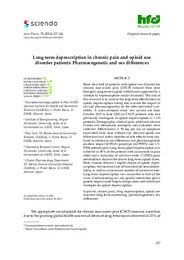Título :
Long-term deprescription in chronic pain and opioid use disorder patients: Pharmacogenetic and sex differences |
Autor :
Muriel, Javier 
Escorial, Mónica 
Margarit, César
Barrachina, Jordi
Carvajal, Cristian 
Morales, Domingo 
Peiró, Ana |
Editor :
Croatian Pharmaceutical Society |
Departamento:
Departamentos de la UMH::Farmacología, Pediatría y Química Orgánica |
Fecha de publicación:
2022-11-18 |
URI :
https://hdl.handle.net/11000/32350 |
Resumen :
More than half of patients with opioid use disorder for chronic non-cancer pain (CNCP) reduced their dose
through a progressive opioid withdrawal supported by a rotation to buprenorphine and/or tramadol. The aim of
this research is to analyse the long-term effectiveness of opioid deprescription taking into account the impact of sex and pharmacogenetics on the inter-individual variability. A cross-sectional study was carried out from
October 2019 to June 2020 on CNCP patients who had previously undergone an opioid deprescription (n = 119
patients). Demographic, clinical (pain, relief and adverse events) and therapeutic (analgesic use) outcomes were collected. Effectiveness (< 50 mg per day of morphine equivalent daily dose without any aberrant opioid use behaviour) and safety (number of side-effects) were analysed in relation to sex differences and pharmacogenetic markers impact [OPRM1 genotype (rs1799971) a nd C YP2D6 phenotypes]. Long-term opioid deprescription was achieved in 49 % of the patients with an increase in pain relief and a reduction of adverse events. CYP2D6 poor metabolizers showed the lowest long-term opioid doses. Here, women showed a higher degree of opioid deprescription, but increased use of tramadol and neuromodulators, as well as an increased number of adverse events. Long-term deprescription was successful in half of the cases. Understanding sex and gender interaction plus a genetic impact could help to design more individualized strategies for opioid deprescription.
|
Palabras clave/Materias:
chronic pain
drug deprescription
opioid use disorder
long-term monitoring
pharmacogenetics
sex differences |
Área de conocimiento :
CDU: Ciencias aplicadas: Medicina: Farmacología. Terapéutica. Toxicología. Radiología |
Tipo de documento :
info:eu-repo/semantics/article |
Derechos de acceso:
info:eu-repo/semantics/openAccess |
DOI :
https://doi.org/10.2478/acph-2023-0018 |
Publicado en:
Acta pharmaceutica (Zagreb, Croatia) 73 (2023) 227–241 |
Aparece en las colecciones:
Artículos - Farmacología, Pediatría y Química Orgánica
|

 La licencia se describe como: Atribución-NonComercial-NoDerivada 4.0 Internacional.
La licencia se describe como: Atribución-NonComercial-NoDerivada 4.0 Internacional.
.png)